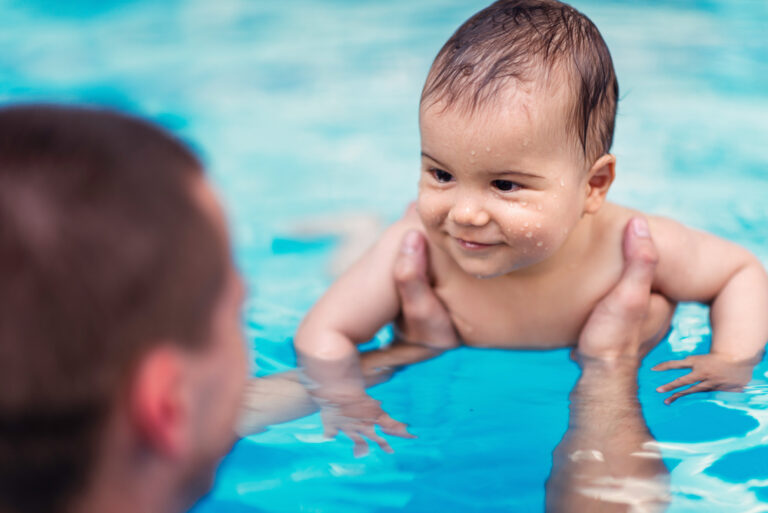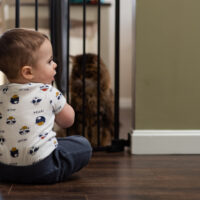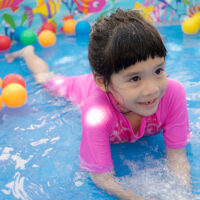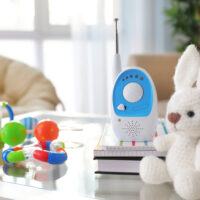Growing up in South Florida, we lived in the pool during the summer. If you have a baby, you may be wondering if they’re old enough to get into a pool with you. Below we’ll break down when a baby can go in a pool. Their cute little feet will be splashing away in no time!
A Baby’s First Time in the Pool
The ideal age for babies to first go into the water is around 2-4 months. While there is no specific guideline, it’s not recommended for newborns to go swimming in a pool quite yet. It’s always a good idea to wait until your baby has gotten their first few doses of vaccines before taking them into a pool, specifically a public pool.
In fact, if you are taking them to a public pool that sees a lot of traffic, you may consider waiting until your baby is 6 months of age. There is so much your baby can pick up in a public pool and the surrounding area so it may be worth it to wait just a few extra months.
When you first introduce your baby to the pool, it’s best to do it in 10-minute increments. This way, you can see if they are getting too cold or not. Ensure you wrap them up as soon as you get them out of the water. A nice warm towel will do the trick.
If your baby is right at two months, you might consider swimming in your own pool or that of a friend’s. Unfortunately, public swimming pools can have various contaminants, even if they have been treated with chlorine.
Finally, don’t force your baby into the pool. If they seem upset when in the pool, take them out. The last thing you want to do is instill a fear of water at such a young age.
Here’s a rundown of everything you would want to know before you take your baby swimming for the first time.
Considerations
The Temperature of the Pool
You want to make sure the temperature of the pool is ideal for your little one. Babies can’t regulate their body temperatures like adults, so it’s important to make sure they don’t get too cold. If the water feels cold to you, it’s certainly too cold for your baby.
In addition, you should never let a baby go into a hot tub or a pool with very hot water. As a note, you should steer clear of hot tubs until your child is at least five years old. There is a risk of them overheating or becoming dehydrated.
Keep Your Baby Clean in the Pool
Make sure to check your baby’s diaper while they are swimming as well. While swim diapers are necessary when swimming, they are not meant for bowel movements, and if you don’t change them right away, it can cause fecal matter to seep into the swimming pool. Nobody wants to go swimming in that.
In addition, you do not want to let your baby go swimming in a regular diaper. They are not meant to soak up that much water and will look like you haven’t changed your baby in weeks. If your baby is not properly covered, everything is going to go right into the pool water. You don’t want to be that person.
Protect Babies From the Sun
Babies over 6 months of age should always wear sunscreen when they are outside. In addition, putting a baby sun hat on will provide extra protection. Babies have very sensitive skin and can easily burn if you don’t take the necessary precautions.
You’ll want to be mindful of the time and reapply sunscreen every 90-120 minutes, especially if the baby is going into the water. I’ll be honest, applying sunscreen to my three kids is my least favorite part of summer, but I understand it’s also one of the most important parts.
There is a history of skin cancer in my family, so I know the importance of sunscreen and the need to apply and reapply, no matter how much my kiddos complain. Sorry, guys!
Finally, since babies under 6 months of age are unable to wear sunscreen, it’s a good idea to buy a baby float that comes with a canopy to help protect them from the sun. Canopies tend to provide SPF protection which is key in preventing sunburn on your little one.
Practice Water Safety
While it may seem obvious, it’s important to not leave your baby alone in a baby float, even for a moment. Swimming lessons can start at a very young age, which is something to consider if you plan on being at the swimming pool often. Sadly, drowning is the number one cause of injury-related death in children ages 1-4.
As a good rule of thumb, your baby should never be more than an arm’s reach from you in the pool. Drownings are silent and not like what you see on TV. Keep your eyes on your baby and off your phone or other distractions.
Finally, if you have a pool in your backyard, I highly recommend installing a pool fence around it. It is a very reassuring thing to have. You can also add an alarm to any doors with access to the pool, so you will be alerted if they are opened.
Pool alarms are also available, which detect any waves on the surface, and therefore would send an alert if a child fell in. I’m on the fence about these because I would worry about it being completely accurate. A pool fence really is the best method to keep little ones out of the pool.
FAQs – Baby’s First Time in a Pool
Is chlorine safe for babies?
While chlorine is meant to keep bacteria out of the swimming pool, it can cause a risk to little ones. Some studies say exposure to chlorine at a young age can lead to respiratory problems, like asthma, further down the road.
This hasn’t been 100% proven, but it would be best to avoid indoor pools where there isn’t as much space for air to circulate if you are concerned about this. This is why when you walk into an indoor pool, there is a strong smell of chlorine.
The reality is, chlorine is a harsh chemical, and you might notice your child has irritated skin after they get out. It’s a good idea to bathe your baby, or at the very least rinse them off, after going for a swim.
Finally, keep an eye on whether your baby accidentally drinks any of the water. A small infant isn’t going to be able to try, but once they get a little bigger, you may catch them trying to take a quick swig of water. A little bit won’t hurt them, but you don’t want them swallowing too much.
What should a baby wear for swimming?
So, now your baby is ready to go for their first swim, but what do they wear? While this isn’t New York Fashion Week, it’s still important to consider how you dress your little one. As previously mentioned, you will want to get a swim diaper instead of allowing them to swim in a regular diaper.
There are disposable swim diapers, but I recommend getting a reusable one. They are reasonably priced and gentler on the environment. I also never seemed to go through a whole pack of disposable ones, and I’m not sure why I didn’t discover the reusable ones sooner.
In addition to a swim diaper, you will want to find the right swimsuit to keep them covered. While there are plenty of cute ones on the market, I always opt for the most coverage and those that offer SPF protection.
I love the long-sleeve SPF swim shirts for kids. It also means there is less area that I have to lather on the sunscreen. A win for everyone involved. They make them for mamas, too!
When should a baby start swimming lessons?
The American Academy of Pediatrics (AAP) recommends children as young as one begin taking swimming lessons. Doctors previously recommended waiting until your child was four years of age because they didn’t believe any child younger could learn how to swim.
In addition, the AAP worried parents would assume they didn’t have to be as vigilant if their child had attended swimming lessons. Even after your child seems like a good swimmer, it’s always important to keep an eye on them.
A specific type of swimming class, ISR (Infant Swimming Resource), teaches children to turn over and float if they were to fall into the water. It doesn’t teach swimming, so that would need to be taught, but it’s a way to help prevent drowning if they accidentally fall into the pool.
When is it okay for a baby to go into the ocean?
If you plan a summer beach trip, you may wonder if you can take your baby into the ocean. It’s best to wait a little longer before you take your baby into saltwater. At 6 months of age, your baby can go for a dip in the ocean.
In addition, it’s important to make sure your baby doesn’t drink any of the saltwater. Too much salt can cause trouble to their little kidneys. You also don’t know what type of bacteria is lurking in the ocean waters, and since babies don’t have stellar immune systems yet, you want to be careful with that.
Like with the swimming pool, make sure to apply sunscreen to your little one and always keep an eye on them. Don’t consider pool floats as life preservers. It would be best if you did not rely on them for safety. Even if your baby is older and uses a life vest or similar product, it’s still highly advisable to stay right by them.
Final Thoughts
Once a baby is old enough to go for a swim, it’s a fun, refreshing summer activity. A favorite of many for the summer. It’s important to follow safety guidelines, including applying sunscreen and keeping a close watch on your baby. Consider enrolling your child in a local swimming lesson as a way to get them used to water.
Finally, it’s important to make sure you are cleared to go into the pool. If you are ready to take a dip with your baby when they hit two months, that means you didn’t give birth that long ago. You’ll want to make sure your doctor gives you the okay to go into the swimming pool. Then you and your little bestie can swim away.






